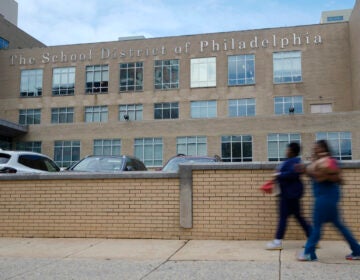Philadelphia hunts for a new breed of superintendent for lean times
The search is underway for a new leader to run Philadelphia’s public schools. The School Reform Commission or SRC, which oversees the school district, knows the type of superintendent it’s looking for but is asking for public feedback through a series of meetings. This evening marks the final public meeting. It’s already clear that the next school district leader will play a different role than previous superintendents.
It’s a bright, sunny morning outside South Philadelphia High, and inside Lori Shorr is describing a school district in a state of profound transition.
“One in four kids students that are in a public school this year are in a charter school,” said Shorr. “There’s been a lot of talk about the move to a diverse provider model – we’re there already. What we haven’t done is changed the way we support those schools. We still have pretty much a command and control central office.”
Shorr is Mayor Michael Nutter’s top education official, and she sits on the superintendent search committee. She’s here today to get feedback from parents and community members about the School Reform Commission’s job description. About forty people listen as she explains that the SRC wants an experienced manager who can handle a large, diverse organization. Being a professional educator isn’t a requirement. In fact, part of the job description is to grant more educational responsibilities to principals.
“If you’re a principal at South Philly you probably have a very different set of needs in your building than an elementary school in the northwest,” said Shorr. “We feel like we should push the money and decision making down to the school level, so that we have principals that make those decisions.”
In the audience sits Lottie Wehbe Bruno, a district employee who thinks the basic qualifications for the next superintendent are pretty simple: “Caring, determination, and a background in some type of education, and dealing with people — especially, the young people.”
Wehbe Bruno has spent forty years as a secretary at Bok High School. In theory, she says, empowering principals makes sense. But she wonders how decentralization can work when so many schools are virtually falling apart.
“Unless someone’s willing to look at what is needed, nothing’s going to get done, you see,” said Wehbe Bruno. “Maybe the parents choose not to go to this school, go to another school outside of the district because of these conditions.”
SRC members say they’re looking for someone who can hold schools of all kinds to a standard of excellence, while raising money from every possible source, and working effectively with teachers, administrators, unions and communities. They’re not looking for another Arlene Ackerman, who came to Philadelphia with a comprehensive but expensive vision for overhauling failing schools. But they do want the kind of leader who can win over people like Tamika Williams, who has come to the South Philly High meeting, even though she home-schools her ten year old daughter.
“I feel like if ever she is going to be in school, then I need to start being part of this process.”
Like others here, Williams says the district’s top priority must be success in the classroom. She says her neighborhood school has a fine library and a new music program, but right now neither its climate nor its academics are anywhere close to her standards. She worries that a decentralized system could leave it falling even further behind.
“Autonomy is not equal. Separate is not equal. decentralization is currently the goal,” said Williams. “If that is the case, there need to be some supports for schools that don’t have that community involvement.”
Parents at the meeting liked the idea of principals having more freedom to make their schools effective. But they don’t want to see autonomy used as a cost-cutting strategy. Those worries have spurred a petition drive calling on the SRC to find an experienced educator for the top job. Retired teacher Karel Kilimnik is part of a group of Occupy Philadelphia activists behind the petition.
“The best superintendent we had was Constance Clayton. Because she came up from the ranks,” said Kilimnik. “She was a teacher, she was a principal, she worked her way up through the ranks. She was an educator. She was not a businessperson.”
Kilimnik’s group has gathered several hundred signatures and hopes for many more. But she knows that the district has changed dramatically since Clayton stepped down eighteen years ago. And she knows that it remains in the throes of an unprecedented fiscal crisis. Lori Shorr says those budget woes have been a driving force behind the districts’ new focus on decentralization.
“I guess I would go so far as to say, cost woke everybody up,” said Shorr. “A $700 million deficit does things to people.”
Shorr says the next superintendent will take full responsibility for the success of all schools, even as the role of the central office shrinks. But she acknowledges that the district has just begun to explore how school autonomy might actually work in practice.
“What it means is that more people have to take responsibility for their schools,” she said. “Some communities will do that, some won’t, and then what do you do? I don’t know.”
Officials hope to have a new superintendent in place by July.
WHYY is your source for fact-based, in-depth journalism and information. As a nonprofit organization, we rely on financial support from readers like you. Please give today.




